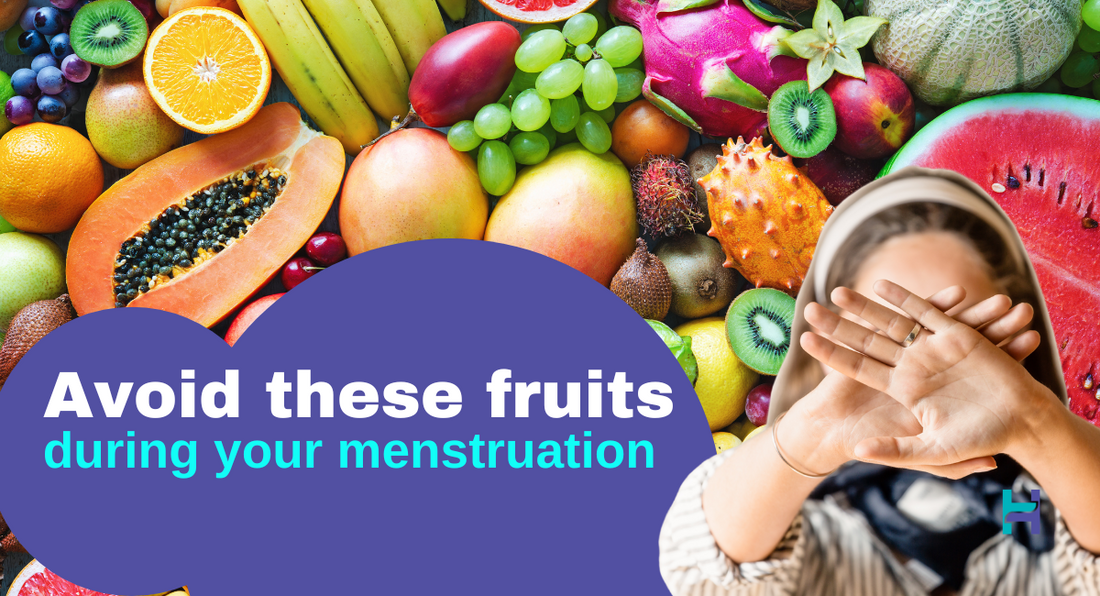During menstruation, the body experiences a range of hormonal shifts that can influence everything from mood to digestion. While numerous fruits provide valuable nutrients that can ease period symptoms, some fruits can actually exacerbate some discomforts. This guide examines which fruits you may want to restrict or avoid during your menstrual cycle and why.
Why some fruits may affect your period
Before diving into specific fruits to avoid, we must understand why certain foods impact menstruation differently:
- Water retention: Some fruits can increase bloating and water retention.
- Sugar content: Fruits high in sugar can trigger inflammation and mood swings.
- Cold properties: According to traditional medicine practices, certain "cooling" fruits may intensify cramps.
- Digestive impact: Some fruits is known to worsen digestive issues that are already heightened during periods.
Here are the 5 fruits you should avoid during periods
1. Pineapple
Pineapple has bromelain, an enzyme that can possibly cause increased blood flow and intensify bleeding in women with heavy periods, although little research is available on this effect; however, strangely enough, some women say that pineapple's anti-inflammatory properties actually lessen menstrual cramps instead of exacerbating them. For those worried about pineapple's possible effects, papaya during periods is a safer choice with comparable anti-inflammatory benefits without the possible increased blood flow issues.
2. Watermelon
Watermelon is a fruit that can keep you hydrated and cool on the inside. It has been utilized in Chinese and Ayurvedic medicine to yield cooling effects. However, for females in the menstrual period, this sour taste from watermelon may have a deteriorating effect on the condition of cramps. It is known that warm foods help during menstruation, mainly by promoting blood flow and hence decreasing the problems that have been accumulated according to the Chinese reading on the issue.
Watermelon, with more than 90% of water, can be the reason for bloating. Period bloating is a common symptom among most women because of hormonal changes and water retention, so watermelon turns out to be the least appropriate option in this case.
Another good practice is to go for berries like amla or jamun that do wonders for keeping the body hydrated. These berries not only provide the necessary fluid for the body but also contribute to the excretion of radical oxygenated species. Being rich in powerful antioxidants, these berries fight inflammation, which is of phenomenal importance, as it is a major source of discomfort during a period.
They also have anthocyanins and ellagic acid, the compounds that play a significant role in reducing the inflammation to cure the condition, and therefore, make it possible to lessen the period's severity and duration of pain.

3. Citrus Fruits
During your period, some fruits are better avoided to minimize discomfort. Citrus fruits like oranges, lemons, and grapefruits contain high acidity levels that may worsen digestive issues common during menstruation. Women who already experience acid reflux or stomach sensitivity might find their symptoms intensify after consuming these fruits.
Why citrus can be problematic during periods:
- Contains high concentrations of citric acid that can irritate the digestive tract
- May trigger heartburn when hormonal changes already affect digestion
- Can increase stomach acidity when the digestive system is more sensitive
- Might exacerbate nausea that some women experience during menstruation
Instead, opt for gentler fruits like bananas or apples, which provide essential nutrients and fiber without the digestive irritation, helping maintain comfort during an already challenging time.
Also read: Learn about benefits of banana during periods
4. Unripe Bananas
Eating ripe bananas is preferable while menstruating, whereas unripe bananas are less favorable. One reason unripe bananas are frowned upon by some is due to the amount of resistant starch they contain, which is poorly digested in the body. Resistant starch can slow digestion, and in some cases, cause constipation. Many women experience bloating and constipation during menstruation, and eating unripe bananas can worsen those symptoms. Constipation causes physical discomfort for a person, which can directly impact their mood and energy level. That's why you should be careful of bananas during your period.
5. Dried fruits with added sugar
We should avoid dried fruits that contain added sugar, especially during periods. These sugary snacks can spike blood sugar levels, which may lead to inflammation and mood swings. Since our hormones are already fluctuating during this time, added sugar can make things worse. It might leave us feeling irritated or bloated. Many packaged dried fruits are coated with sugar or syrup, which reduces their health benefits. Instead, we can go for fresh fruits that are naturally sweet or opt for unsweetened dried fruits. Eating them in small, moderate amounts can satisfy our cravings without causing a sugar crash. Making mindful swaps like this helps us feel more balanced during our cycle.
Fruits that may help during your period
Not all fruits are problematic during menstruation. In fact, many can help ease these symptoms:
1. Bananas: Ripe bananas are rich in potassium and vitamin B6, which can reduce bloating and mood swings
2. Berries: Strawberries, blueberries, and raspberries contain antioxidants that fight inflammation
3. Apples: Provide fiber that helps regulate digestion and contains quercetin, which has anti-inflammatory properties
4. Kiwi: Rich in vitamin C and E, which can help reduce period pain
5. Dates: Dates during periods provide iron and natural sugars for energy when dealing with fatigue
It's important to note that every woman's body responds differently to foods during menstruation. What triggers symptoms for one person might provide relief for another. Pay attention to how your body responds to different fruits during your cycle and adjust your diet accordingly.
Keep a food diary for a few months to track how certain fruits affect your period symptoms. This personalized approach is often more effective than following general recommendations.
When to consult a doctor?
If you experience severe period pain, extremely heavy bleeding, or significant mood changes that interfere with daily life, consult a healthcare provider. These symptoms could indicate underlying conditions like endometriosis or PMDD (Premenstrual Dysphoric Disorder) that require medical attention.
To summarize
Even though some fruits could make menstrual symptoms worse, it cannot be denied that a sensible diet filled with nutrients is a major factor during this time of the month. The thing here is to understand what your body tells you and to take the necessary steps concerning the fruits instead of stopping its consumption as a whole for the period only.
Add to this that water supply, proper sleep, and moderate physical workouts are also equally important in reducing period discomfort in addition to dietary issues.



